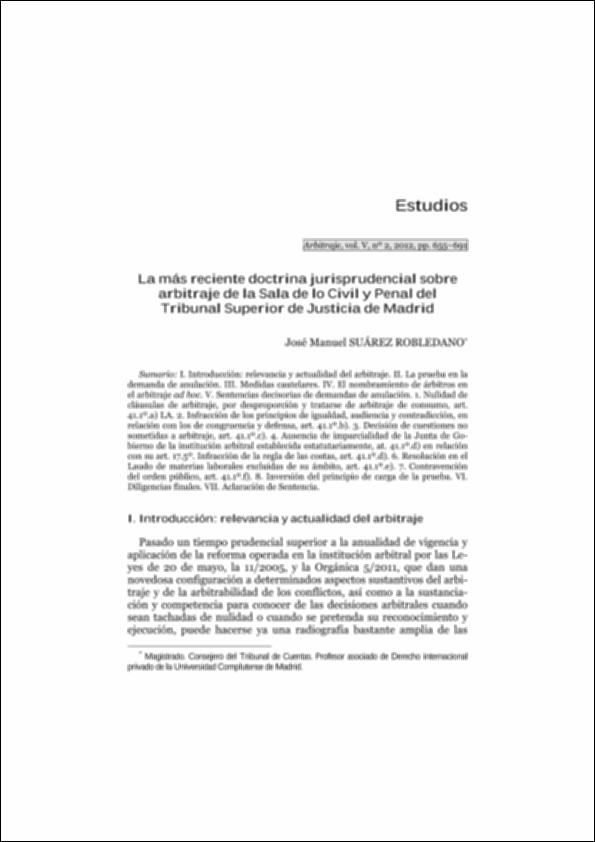Please use this identifier to cite or link to this item:
http://hdl.handle.net/10637/13084La más reciente doctrina jurisprudencial sobre arbitraje de la Sala de lo Civil y Penal del Tribunal Superior de Justicia de Madrid.
| Title: | La más reciente doctrina jurisprudencial sobre arbitraje de la Sala de lo Civil y Penal del Tribunal Superior de Justicia de Madrid. |
| Authors : | Suárez Robledano, José Manuel |
| Keywords: | Arbitraje; Jurisprudencia; Anulación de laudos; Nombramiento de árbitros; Medidas cautelares; Arbitration; Jurisprudence; Annulment of awards; Appointment of arbitrators |
| Abstract: | Son objeto de consideración, a través de las páginas del artículo en cuestión, las principales novedades de la doctrina y la práctica judicial sobre el arbitraje desde la vigencia de
la competencia de la Sala de lo Civil y Penal del TSJ de Madrid. Dichas decisiones judiciales o Sentencias y Autos han tratado sobre diversas cuestiones de relevancia en relación con la impugnación del Laudo arbitral, entre las que se encuentran las referidas a las
pruebas que pueden ser admitidas y las que no en el procedimiento ante dicha Sala, o sea
el de impugnación. Al propio tiempo se trata con detenimiento la solicitud de medidas
cautelares de suspensión de la ejecución, las cuestiones referidas al nombramiento de
árbitros en el arbitraje ad hoc, y el tratamiento que ha merecido al Tribunal cada uno de
los motivos de nulidad de la decisión arbitral, particularmente del orden público y su
definición restrictiva y no amplia adoptada, terminándose con los comentarios adecuados
en orden a la aclaración de la Sentencia del Tribunal que decide la apelación así como las
denominadas “Diligencias finales”, que han sido propuestas por el propio Tribunal en
alguna ocasión. Through the pages of this article, its is important to talk about the main innovations from doctrine and legal practice about arbitration since the Civil Chamber and the Criminal Chamber of the Madrid’s TSJ has a valid competence to know about it. These judicial decisions or judgements and orders, have discussed various relevant issues, related to the recourse against arbitral award. We emphasize those that refers to the evidence which may be admitted in the trial, but also those which may be not admitted. This is what is called “judicial challenge”. While this is happening, it is carefully dealt the request of precautionary measures which can stop the execution, also the issues related to the appointment of arbitrators in the “ad hoc” arbitration and the treatment of the different reasons that the Court has considered about nullity of the arbitral decision, especially those that refers to social order, in a restrictive sense. It ends with the appropriate comments in order to clarify the decision of the Court. The Court decides about appeals and the “final proceedings”, which have been proposed by the Court in some cases. |
| Description: | En: Arbitraje: revista de arbitraje comercial y de inversiones. eISSN. 2603-9281. vol. 5, n. 3, 2012, pp 655-691 |
| URI: | http://hdl.handle.net/10637/13084 |
| Rights : | http://creativecommons.org/licenses/by-nc-nd/4.0/deed.es |
| Issue Date: | 1-Dec-2012 |
| Appears in Collections: | 2012 Arbitraje nº 3 |
Items in DSpace are protected by copyright, with all rights reserved, unless otherwise indicated.


